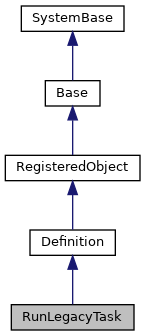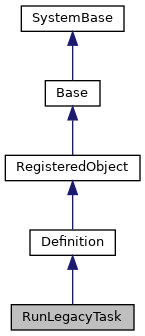This class provides a way for users of previous versions of Task Manager to easily migrate their tasks which were based on 'ExecuteCode'. More...


Public Member Functions | |
| _.Library.Status | OnTask () |
| This method is responsible for executing the task. More... | |
 Public Member Functions inherited from Definition Public Member Functions inherited from Definition | |
| _.Library.List | GetSettings () |
| Return a serialized list of user-defined Property values for an instance of this Task as a $List. More... | |
| _.Library.Status | OnSubmit (_.Library.String pID, _.Library.String pSubmit) |
| This callback is called when this form is submitted. More... | |
| _.Library.Status | SetSettings (_.Library.List pState) |
| Called by the Task Manager prior to running OnTask() to set all Property values. More... | |
Public Attributes | |
| ExecuteCode | |
| The value of this property is used as the argument to an XECUTE command. More... | |
Static Public Attributes | |
| TaskName = None | |
| This class provides a way for users of previous versions of Task Manager to easily migrate their tasks which were based on 'ExecuteCode'. More... | |
 Static Public Attributes inherited from Definition Static Public Attributes inherited from Definition | |
| DOMAIN = None | |
| This class defines a task that can be executed by the Task Manager. More... | |
| RESOURCE = None | |
| This specifies a security resource and optional permission. More... | |
| TaskName = None | |
| This defines the user-visible name of this task. More... | |
Additional Inherited Members | |
 Static Public Member Functions inherited from Definition Static Public Member Functions inherited from Definition | |
| _.Library.Boolean | CheckPermission (_.Library.String taskClass, _.Library.String namespace, _.Library.Status sc) |
| This method checks if the current process has the permission defined by the RESOURCE parameter for the given Task class. More... | |
| _.Library.String | GetCollectionType (_.Library.String propertyName, _.Library.String tCollection) |
| Return a collection type for a property. More... | |
| _.Library.String | GetTaskName () |
| Returns the localized name of this task. | |
This class provides a way for users of previous versions of Task Manager to easily migrate their tasks which were based on 'ExecuteCode'.
It is shown as a 'Task type' in the Task Scheduler Wizard so that users may enter their code there.
Note that all new user-defined tasks should be created by subclassing SYS.Task.Definition and editing the OnTask() method. See examples in the [SAMPLES]Sample.Task and Sample.Task* classes.
| _.Library.Status OnTask | ( | ) |
This method is responsible for executing the task.
At the scheduled time, the Task Manager creates an instance of this object, sets any property values using the stored "settings" for the task, and then invokes this method to execute the task.
The user's code may set the value of "Status" to return a status code.
Reimplemented from Definition.
|
static |
This class provides a way for users of previous versions of Task Manager to easily migrate their tasks which were based on 'ExecuteCode'.
It is shown as a 'Task type' in the Task Scheduler Wizard so that users may enter their code there.
Note that all new user-defined tasks should be created by subclassing SYS.Task.Definition and editing the OnTask() method. See examples in the [SAMPLES]Sample.Task and Sample.Task* classes.
| ExecuteCode |
The value of this property is used as the argument to an XECUTE command.
when OnTask is run. The user may also set the value of the variable "Status" to a return code if they wish.
Note that this is provided only for backwards compatibility. All new user-defined tasks should be created by subclassing SYS.Task.Definition and editing the OnTask() method.